Few directors have the same name recognition or consistent fan and critical acclaim as Quentin Tarantino. The director rose to prominence in the early 1990s as a leading figure in the independent scene , then revolutionized the industry with the 1994 release of his classic Pulp Fiction. What followed was a successful film career that helped Tarantino cement himself as an auteur and provocateur.
Tarantino’s films are long, brutal, disruptive, and demanding. They usually feature winding, sprawling, nonlinear plots splattered with blood, profanity, and pop culture references. His dialogue is vivid and fast-paced, his images striking and unapologetic, his narratives hyperviolent and cathartic. Tarantino’s name has become synonymous with quality; his résumé includes many of modern cinema’s most recognizable films, some of which have become enduring parts of American culture. With the news that Tarantino’s upcoming film, The Critic, might be his last, it’s time to reflect on his acclaimed career and determine which of his celebrated films reigns supreme.
10. Death Proof (2007)
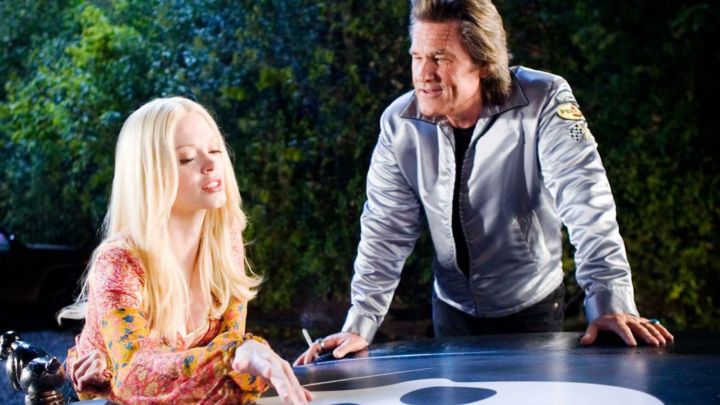
Kurt Russell leads an impressive ensemble in Tarantino’s 2007 ode to exploitation films, Death Proof. The actor stars as Stuntman Mike McKay, a serial killer who targets young women and kills them by taking them on drives in his modified cars. Rosario Dawson, Mary Elizabeth Winstead, Tracie Thoms, Rose McGowan, and Zoe Bell also star.
The films was originally released as part of Grindhouse, a double feature that also included Robert Rodriguez’s box office bomb-turned-cult-classic Planet Terror. Death Proof is Tarantino’s most overlooked film, and with reason. Fun, fast-paced, and endlessly entertaining, the film is also wildly uneven. For the first and last time in his filmography, Tarantino’s witty dialogue feels out of place and clumsy, more an info dump of random facts and quirks than the dynamic exchanges of his previous, better efforts.
9. The Hateful Eight (2015)
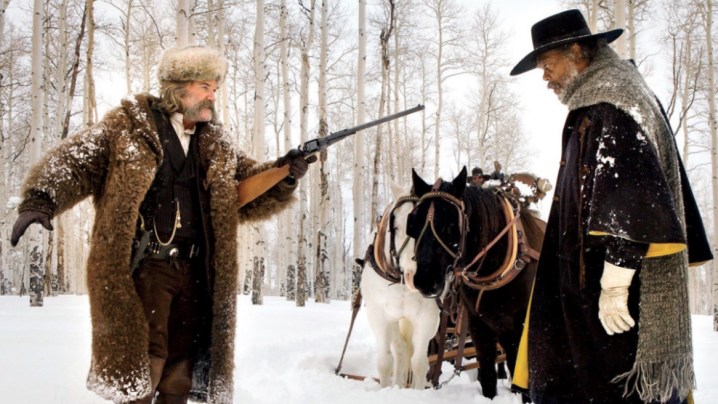
The Hateful Eight gathers two of Tarantino’s best collaborators, Samuel L. Jackson and Russell, and combines them with a stellar supporting cast, including an Oscar-nominated Jennifer Jason Leigh. Set in the aftermath of the American Civil War, the plot follows eight strangers who seek refuge from a snowstorm at a stagecoach stopover. However, things aren’t what they seem, leading to a violent standoff.
There’s a lot to love about The Hateful Eight, Tarantino’s love letter to the Western genre: Ennio Morricone’s beautiful score, Jennifer Jason Leigh’s venomous and bold performance, and top-notch production values despite the closed, claustrophobic setting are some of the film’s greatest assets. However, it’s not as tightly crafted as other Tarantino efforts, with a narrative that threatens to overwhelm rather than challenge. The Hateful Eight drags after a riveting first act, although it has enough of Tarantino’s signature tropes to make for a satisfying, slowly unwinding mystery.
8. Kill Bill: Volume 2 (2004)
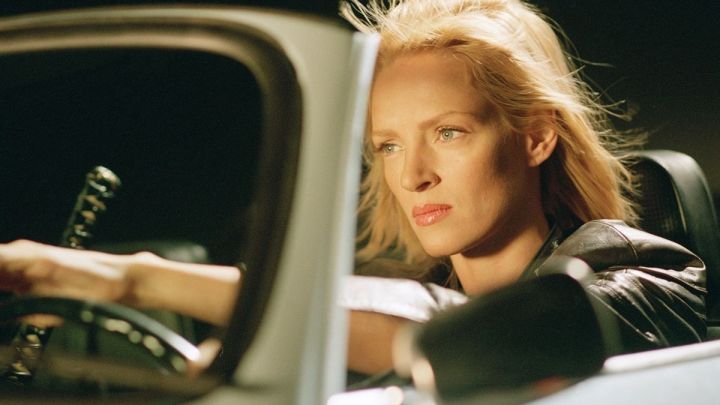
More so than his independent efforts from the ’90s, the Kill Bill duology solidified Tarantino’s reputation as one of the most influential modern movie directors. Volume 2, released in 2004, features Uma Thurman as the vengeful Bride, who is targeting the last two enemies on her list, Budd and Elle Driver, before going after the big man himself, Bill.
Kill Bill: Volume 2 is longer, talkier, and a tad more self-important than its predecessor. Thurman is once again in top form as the Bride, arguably the most iconic character in her career, and she’s aided by strong supporting performances by Michael Madsen and a scene-stealing Daryl Hannah. The film’s climax between Thurman and the late David Carradine is a thing of beauty in its subversive approach to cathartic vengeance. Kill Bill: Volume 2 ends things on a high, albeit somewhat underwhelming note, intentionally leaving the door open for a third volume. Alas, it never came, making the film seem weirdly incomplete, the middle chapter of a larger story that never received proper closure.
7. Django Unchained (2012)
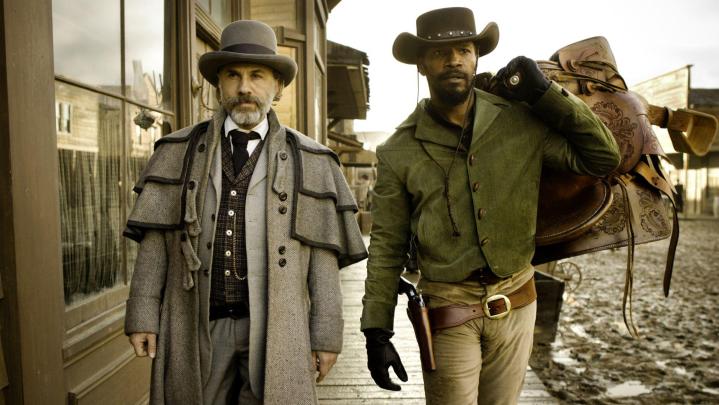
A group of Oscar-winning actors star in Tarantino’s 2012 revisionist Western Django Unchained. Jamie Foxx plays Django, a recently released slave who joins a German bounty hunter to rescue his long-lost wife from the sadistic Calvin Candie. Christoph Waltz, Leonardo DiCaprio, and Samuel L. Jackson also star.
Django Unchained is among Tarantino’s bloodiest, boldest, and most striking pictures. Unafraid to challenge the Western genre while still approaching it with an admittedly loving gaze, the film is an eclectic and explosive mix of themes, ideas, and styles. Tarantino gets stellar performances from his prestigious cast, offering a sensationalistic and bombastic look at one of history’s great tragedies. Like most of the director’s films, Django is overlong, and the third act can feel like a chore, especially after the spectacular sequence that closes the film’s second third. Still, Django Unchained is a passionate and provocative effort and one of Tarantino’s most uncompromising films.
6. Once Upon a Time… in Hollywood (2019)
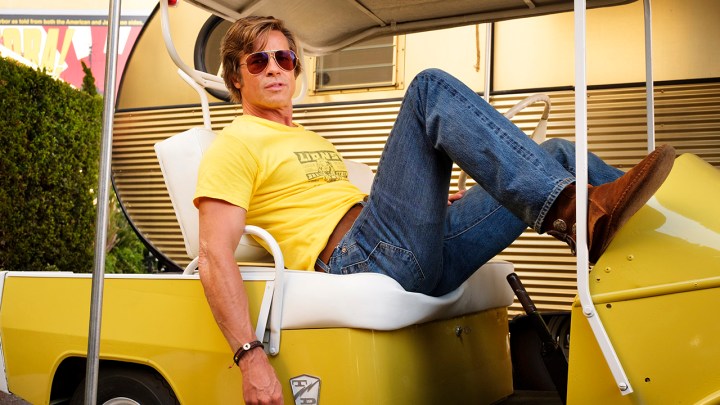
Tarantino’s latest film defies genres and conventions, refusing to be pinned down as only one thing. Set in 1969 Los Angeles against the backdrop of the Tate-LaBianca murders by Charles Manson’s followers, Once Upon a Time… in Hollywood stars Leonardo DiCaprio and Brad Pitt as a fading actor and his stunt double, who try to navigate the rapidly changing business they once knew. Margot Robbie co-stars as Sharon Tate, with the film adopting a revisionist approach to her story.
Once Upon a Time… in Hollywood is Tarantino’s love letter to cinema. Powered by two stellar performances and featuring a sprawling narrative that paints a vivid, thriving picture of 1960s LA, the film is arguably Tarantino’s most mature project. Once Upon a Time… in Hollywood is overlong, overflowing with ideas and characters, and greedy in its demand for everything from its audience. However, it’s also rewarding and cathartic, offering some form of redemption to a city that’s long been associated with excess, pain, and broken dreams.
5. Kill Bill: Volume 1 (2003)

Thurman reunited with Tarantino for 2003’s Kill Bill: Volume 1. The actress plays the Bride, a woman recently awakened from a coma who goes on a violent rampage against the association that betrayed her on her wedding day. Lucy Liu and Vivica A. Fox co-star as the first two targets on her list.
Kill Bill: Volume 1 is Tarantino’s first purely commercial film, a classic revenge thriller dripping with style, flair, and confidence. However, it’s also one of his best films, an unadulterated effort from one of cinema’s most idiosyncratic auteurs. Thurman delivers a career-best performance as the Bride, supported by an equally captivating Liu. Kill Bill: Volume 1 proves style can be as important as substance — and in some genres, it might even be more relevant to tell a striking and satisfying story.
4. Jackie Brown (1997)
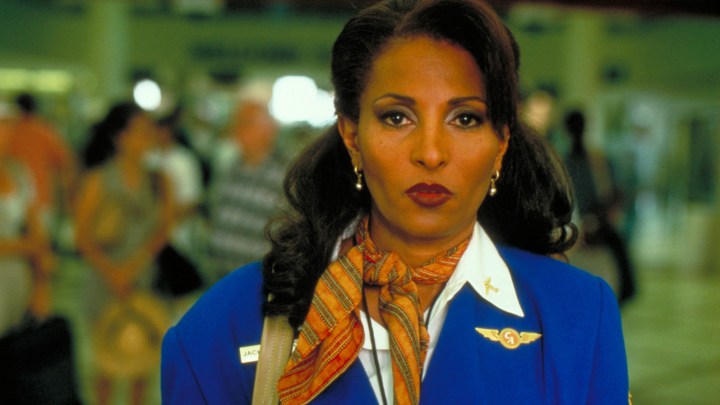
Jackie Brown, Tarantino’s follow-up to Pulp Fiction, is an ode to the criminally underrated talents of Pam Grier. The Blaxploitation legend stars as the titular character, a flight attendant caught smuggling money for her arms dealer boss. Caught between a violent gangster and the distrustful agents who busted her, Brown decides to pursue her own interests and double-cross both parties. Grier dominates Jackie Brown from beginning to end, offering the kind of comprehensive, entrancing, career-defining performance that only comes once in an actor’s lifetime.
The film has all the makings of a great Tarantino movie: witty dialogue, explosive sequences, charming yet unsettling performances, and a distinctive visual style. Make no mistake, however; this is Grier’s movie, and Tarantino makes no attempt to hide it. In many ways, Jackie Brown was overshadowed by its predecessor, especially with critics and audiences expecting another Pulp Fiction. Instead, they got the closest thing to a character study that Tarantino has ever done. Time has been kind to Jackie Brown, and many now consider it a misunderstood classic and one of Tarantino’s all-time best. Grier’s glaring omission in the Best Actress category is a mistake the Academy will never live down.
3. Reservoir Dogs (1992)

A milestone of independent filmmaking, Tarantino’s Reservoir Dogs was a turning point in American cinema. An ensemble cast including Harvey Keitel, Tim Roth, Michael Madsen, Steve Buscemi, Chris Penn, and Tarantino himself star in the story of a group of diamond thieves whose latest heist goes horribly wrong.
Reservoir Dogs introduces Tarantino’s trademark style; it’s stylish, confident, hyperviolent, quick, witty, clever, and unflinching. It juggles multiple distinct characters with an ease that seems impossible, throwing them into a brutal and chaotic world that is alluring and inviting, yet discomforting and often repulsive. Reservoir Dogs turned Tarantino into an overnight sensation and challenged the boundaries of independent filmmaking, which would be outright obliterated by the director’s 1994 follow-up.
2. Inglourious Basterds (2009)

Pitt, Waltz, Michael Fassbender, Mélanie Laurent, and Diane Kruger star in Tarantino’s 2009 revisionist war movie Inglourious Basterds. Set during World War II, the film focuses on two different attempts to kill Adolf Hitler and his main allies: the first by a young French woman seeking revenge for her family’s deaths and the second by a group of Jewish American soldiers.
Inglourious Basterds is a stunning work of genius and possibly Tarantino’s most daring film. It juggles storylines, characters, tropes, and historical events, creating a brilliant portrayal of war that never shies away from its horrible nature, but expertly blends it with Tarantino’s eclectic filmmaking style. Aided by a glorious tour-de-force performance by an Oscar-winning Waltz, Inglorious Basterds is a triumph, the rare film that challenges all conventions and expectations and instead creates something new, original, and truly game-changing.
1. Pulp Fiction (1994)
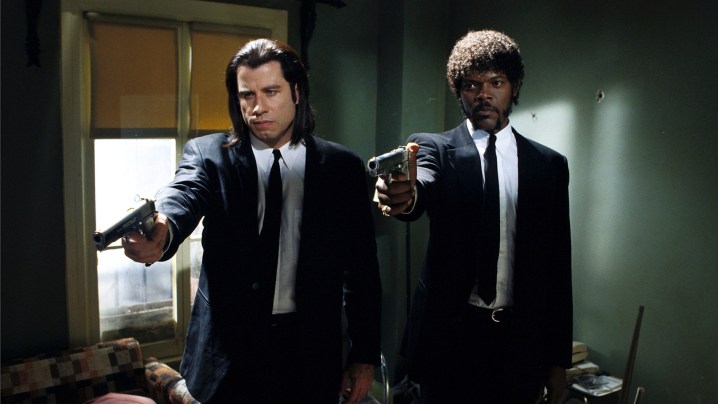
Pulp Fiction was Tarantino’s ticket to international fame and critical acclaim. John Travolta, Jackson, and Thurman lead a massive ensemble, with the film following four storylines set in the underground criminal world of 1990s Los Angeles.
If Reservoir Dogs introduced indie filmmaking to the mainstream, Pulp Fiction took it to the apex of its possibilities. The film is truly one-of-a-kind, a remarkably creative and inspired look at crime and violence that packs so much style, it’s almost flamboyant. The film is wicked, morbidly funny, impressively clever, and utterly unforgettable, an adrenaline injection that revitalized the film industry. Few movies have had such a deep and palpable impact on their time as Pulp Fiction. The film will forever remain Tarantino’s masterpiece, an incendiary triumph that launched an entire cinematic movement and cemented Tarantino as a leading figure in modern pop culture.
Editors' Recommendations
- All of David Fincher’s movies, ranked from worst to best
- All of The Conjuring Universe horror movies, ranked from worst to best
- Paul Verhoeven’s American movies, ranked from worst to best
- All the Indiana Jones movies, ranked from worst to best
- From Khan to Beyond: All the Star Trek movies, ranked from worst to best




